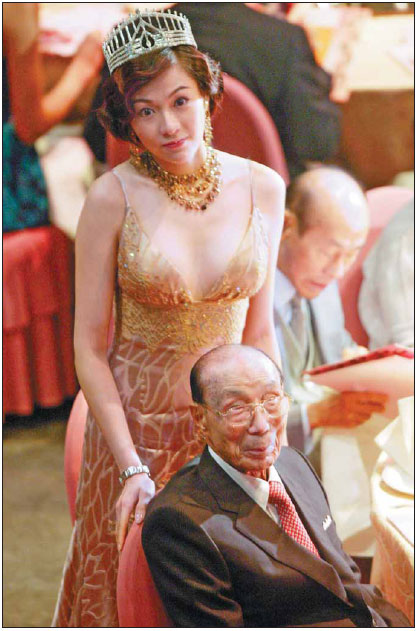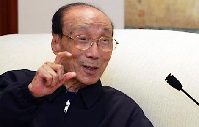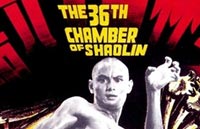|

Miss Hong Kong Pageant 2005 1st runner-up Sharon Luk poses with Run Run Shaw, veteran producer and founder of Shaw Brothers Studio, at the Miss Hong Kong Pageant 2006 in Hong Kong. The pageant, which became a permanent TV fixture in 1973, is one of the Hong Kong institutions spawned by TVB. Paul Yeung / Reuters / Files
|
Younger sibling
Run Run Shaw began his movie career doing odd jobs for his elder brothers' company, the equivalent of a mailroom clerk in Hollywood, but with a much more versatile role. He had just finished high school at an US-run establishment in Shanghai and his father expected him to go on to college. But Shaw seemed to love what he was doing at Tianyi Film Co, rotating through every job, including scriptwriter, actor, director and, finally, cinematographer, a role in which he excelled.
Run Run's eldest brother founded Tianyi in 1924. The company quickly grew into one of the top three film studios in Shanghai through its adaptations of Chinese folk tales that reinforced traditional moral values, which ran counter to the enlightenment movement of the day. This populist strategy in subject matter continued through all the ensuing incarnations of the brothers' entertainment empire.
In 1926, six major studios formed an alliance to boycott Tianyi. Distributors that wanted to show movies made by the six studios had to agree not to show anything from Tianyi. Partly to deflect the competitive pressures and partly to forestall the possible fires of war from the north, the Shaw brothers decided to explore the market in Southeast Asia, where there was a sizeable ethnic Chinese population. The 19-year-old Run Run and older brother Runme were sent to negotiate with cinema owners and companies.
The two brothers pleaded with exhibitors to show the prints they had brought with them. They rented a horse-drawn carriage and toured the rural areas. Their hard work paid off; soon they were buying up cinemas. The first few years in Southeast Asia, known as the South Seas in China, "gave me so much that was of benefit for the rest of my life", as Shaw later recalled. One of the explanations for his English name, Run Run, comes from that period, when the young man ran around endlessly in his attempts to start a business from ground up. A different explanation, which he endorsed, is the phonetic similarity of Run Run and Renleng, his real given name.
Success allowed Tianyi to shift production to Hong Kong when Japanese bombs began to fall on Shanghai in 1932. Run Run's insistence on adopting sound technology - he made a perilous trip to San Francisco to purchase equipment - resulted in one of the first Cantonese-language films, The Platinum Dragon. The movie was a blockbuster and paved the road for the Shaws' expansion.
The backbone of their business was still in distribution and exhibition across Southeast Asia and by 1939, they owned 139 movie theaters in the region. Their movie empire was eventually crushed by the Japanese invasion of Asia.


